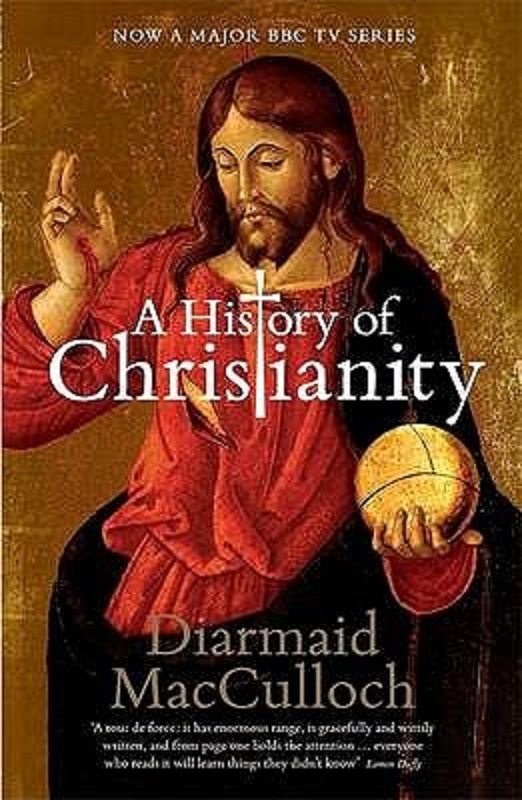
Christianity
The First Three Thousand Years
کتاب های مرتبط
- اطلاعات
- نقد و بررسی
- دیدگاه کاربران
نقد و بررسی

February 8, 2010
Where does Christianity begin? In Athens, Jerusalem, or Rome? How did the early creeds of the church develop and differentiate? What was the impact of the Reformation and the Catholic Counterreformation? How have vital Christian communities emerged in Asia, Africa, and India since the 18th century? Award-winning historian MacCulloch (The Reformation
) attempts to answer these questions and many more in this elegantly written, magisterial history of Christianity. MacCulloch diligently traces the origins and development of Catholic, Orthodox, and Protestant Christianities, and he provides a more in-depth look at the development of Christianity in Asia and Africa than standard histories of Christianity. He offers sketches of Christian thinkers from Augustine and Luther to Desmond Tutu and Patriarch Bartholomew I. Three appendixes contain a list of popes, Orthodox patriarchs, and a collection of Christian texts. Assuming no previous knowledge on the part of readers about Christian traditions, MacCulloch traces in breathtaking detail the often contentious arguments within Christianity for the past 3,000 years. His monumental achievement will not soon be surpassed.

February 15, 2010
Prize-winning author MacCulloch (history of the Church, Univ. of Oxford; "The Reformation") has produced here a marvelous, comprehensive history beginning in 1000 B.C.E. with the development of Greece, Rome, and Israel, the primary cultural and religious traditions that helped shape Christianity from its beginning even until now. MacCulloch pays ample attention to the Orthodox Church, both Eastern and Oriental, as well as to Western Christianity, its reformations, and current "culture wars." The author's carefully reasoned interpretations substantiate his claim to be "a candid friend of Christianity," with happy memories of childhood "in the rectory of an Anglican country parish," searching for good within diverse manifestations of Christianity while also attending to the "foolish and dangerous" within the religion. VERDICT Laypeople not discouraged by its 1000-plus pages will find this book accessible and engaging; it would also make a fine textbook for a one- or two-semester course. Readers wanting a history less than half this length may find L. Michael White's "From Jesus to Christianity" useful even though they will miss MacCulloch's judicious explanations of (human) cause and influence in Christian history. Essential for all libraries collecting on this subject.Carolyn M. Craft, Emerita, Longwood Univ., Farmville, VA
Copyright 2010 Library Journal, LLC Used with permission.

Starred review from February 1, 2010
MacCulloch signals the parameters of his prodigious scholarship when he brackets the Resurrection as a riddle no historian can resolve, then marvels at how belief in the Risen Lord has transformed ordinary men and women into martyrsand inquisitors. Despite his refusal to affirm the faiths founding miracle, MacCulloch demonstrates rare talent for probing the human dynamics of Christianitys long and complex evolution. Even when examining well-known episodessuch as the Church Fathers fight against Gnosticism or the stunning conversion of Constantinethis capacious narrative opens unexpected perspectives. Readers encounter, for instance, surprising connections between Christian doctrine, on the one hand, and ancient Greek philosophy interlaced with Roman politics on the other. As the chronicle fractures into Catholic, Orthodox, and Protestant strands, MacCulloch exposes unfamiliar but unmistakably human personalities who have shaped the worship of the divine. Readers meet, for instance, Gudit, a savagely anti-monastic Ethiopian queen, and Filofei, an irrepressibly ambitious Russian monk. Much closer to our time, we confront Christian enthusiasms that militarists harnessed in World War I, Christian hatreds that Nazis exploited in World War II. Concluding with the perplexities of evangelists facing an implacably secular world, MacCulloch leaves readers pondering a problematic religious future. A work of exceptional breadth and subtlety.(Reprinted with permission of Booklist, copyright 2010, American Library Association.)

























دیدگاه کاربران